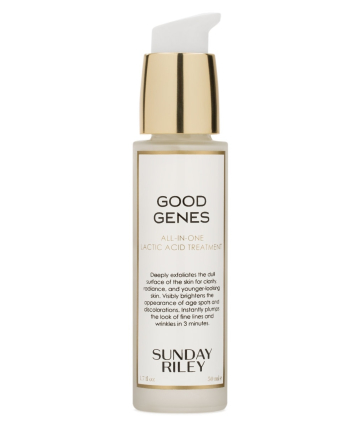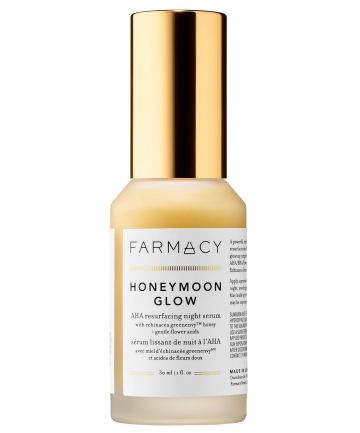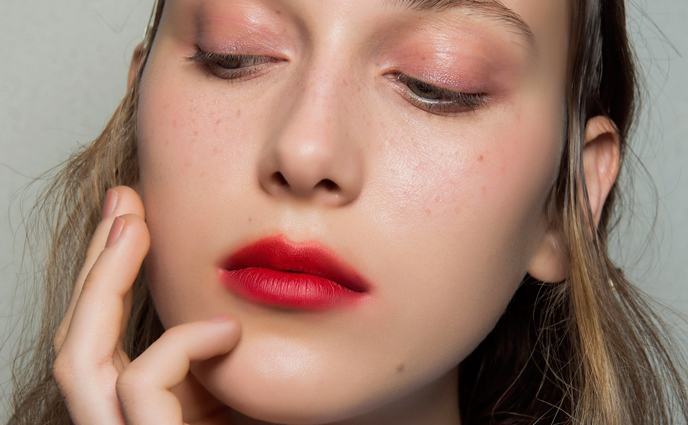As you may have guessed from the name, lactic acid is derived from milk. One of the things that makes it such a popular skin care ingredient is that it exfoliates and hydrates at the same time. And, much like glycolic acid, it's gentle — and "great for those with sensitive skin issues." If acids are something you've always steered clear of, you may want to give this one a try, as Lorencin notes that it has "very minimal to no side effects." Get ready for a "glowing and radiant complexion!"
If you like lactic acid, try: Sunday Riley Good Genes All-in-One Lactic Acid Treatment, $105
Buy now
If you like lactic acid, try: Sunday Riley Good Genes All-in-One Lactic Acid Treatment, $105
Buy now
Though it's something you might notice from your favorite sodas (like Diet Coke), citric acid is also quite popular as a skin care ingredient. "Citric acids are alpha hydroxy acids that are derived from citrus," says board-certified celebrity dermatologist Dr. Anna Guanche. "They exfoliate and renew the skin and in higher percentages, they can be effective as a peel."
If you like citric acid, try: Farmacy Honeymoon Glow AHA Resurfacing Night Serum, $58
Buy now
If you like citric acid, try: Farmacy Honeymoon Glow AHA Resurfacing Night Serum, $58
Buy now
You may have heard the term "mandelic acid" popping up every now and then. As with lactic, citric and glycolic acids, it's an alpha hydroxy acid, this time derived from almonds. "It's gaining popularity as a glycolic stand-in," says Gohara.
If you like mandelic acid, try: Allies of Skin Mandelic Pigmentation Corrector Night Serum, $92
Buy now
If you like mandelic acid, try: Allies of Skin Mandelic Pigmentation Corrector Night Serum, $92
Buy now
Though we tend to associate the term "acid" with exfoliants, hyaluronic acid is actually a humectant moisturizer. Gohara says that it's naturally present in skin, though your body produces less as you age. "It's wonderful at plumping the skin," says Gohara. "In fact, many fillers are made with this." She adds that it's great for adding smoothness and brightness to skin. "I won't leave the house without putting it on topically," she declares.
Another bonus? "It almost never causes an allergic reaction," Guanche says. "I can't think of a single side effect to report."
If you like hyaluronic acid, try: The Ordinary Hyaluronic Acid 2% + B5, $6.80
Buy now
Another bonus? "It almost never causes an allergic reaction," Guanche says. "I can't think of a single side effect to report."
If you like hyaluronic acid, try: The Ordinary Hyaluronic Acid 2% + B5, $6.80
Buy now
Also known as vitamin C, ascorbic acid is "one of the most potent antioxidants for skin," Gohara says. "It's good for daily use to help fight damage from pollution and UV light. It also helps with fine lines, and can even out your complexion and overall skin texture." Additionally, the ingredient is known for its ability to combat dark spots and hyperpigmentation.
Lorencin notes that it can be especially effective when used in conjunction with retinol or hyaluronic acid. Though be sure to use caution: "It's great for most skin types, but it can be irritating to sensitive skin, especially if you're prone to rashes," she says.
If you like ascorbic acid, try: Tatcha Violet-C Brightening Serum, $88
Buy now
Lorencin notes that it can be especially effective when used in conjunction with retinol or hyaluronic acid. Though be sure to use caution: "It's great for most skin types, but it can be irritating to sensitive skin, especially if you're prone to rashes," she says.
If you like ascorbic acid, try: Tatcha Violet-C Brightening Serum, $88
Buy now








